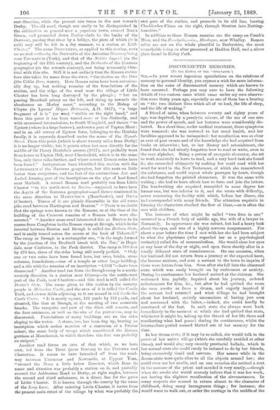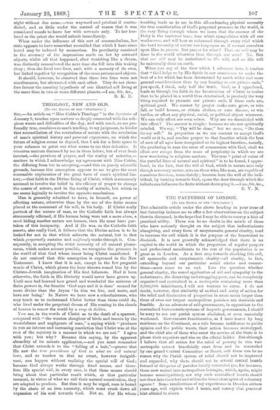DISCONNECTED MEMORIES.
[TO THE EDITOR OF THE " SPECTATOR.")
Sin,—in your recent ingenious speculations on the relations of memory to personal identity, you express a wish for more information on the cases of disconnected memory which are known to have occurred. Perhaps you may care to have the following details of two curious cases which came under my own observation some thirty years ago, especially as one of them has a bearing on " the two distinct lives which all of us lead, the life of sleep, and the life of waking."
A friend of mine, when between seventy and eighty years of age, was deprived, by a paralytic seizure, of the use of one arm and the power of speech, and her features were considerably distorted. In a short time, under medical treatment, these symptoms were removed : she was restored to her usual health, and her faculties appeared to be unimpaired : her recollection was as clear as ever of past events and of the knowledge she had acquired from books or otherwise ; but, to her dismay and astonishment, she found that she had utterly forgotten how to read or write, even to the very alphabet. Being a person of energetic character, she set to work resolutely to learn to read, and a very hard task she found it; she succeeded ultimately by making her maid read with her word for word in the New Testament, of which she remembered the substance, and could repeat whole passages by heart, though she had forgotten the printed characters. It was the same with writing ; she had to learn afresh how to form and join the letters. The handwriting she acquired resembled in some degree her former one, but was inferior to it, and she wrote with difficulty, never recovering the facility with which, before her illness, she had corresponded with many friends. The attention requisite in forming the characters checked the flow of ideas,—as is often the case with children.
The instance of what might be called "two lives in one" occurred in a French lady of middle age, the wife of a lawyer in Normandy. In appearance she was robust, but had a heavy look about the eyes, and was of a highly nervous temperament. For about a year before the time I met with her she had been subject to what the physicians (who regarded her as a psychological curiosity) called fits of somnambulism. She would close her eyes at any hour of the day or night, and open them shortly after in a totally different state of consciousness. On one occasion, when her husband did not return from a journey at the expected hour, she became anxious, and sent a servant to the town to inquire if there were letters from him. Soon after she fell into the abnormal state which was easily brought on by excitement or anxiety. During its continuance her husband arrived at the chateau. She welcomed him joyfully, inquired about his journey, ordered refreshments for him, &c., but after he had quitted the room she soon awoke as from a dream, and eagerly inquired if the servant had returned and what tidings he had brought about her husband, entirely unconscious of having just seen and conversed with the latter,—indeed, she could hardly be convinced of the fact. In each state she always went back immediately to the moment at which she had quitted that state, whichever it might be, taking up the thread of her life there and recollecting what had passel during its continuance, whilst the intermediate period seemed blotted out of her memory for the time.
In her dream state, if it may be so called, she would talk in the patois of her native village (which she carefully avoided at other times), and would sing very sweetly provincial ballads, which in her normal state she could rarely be induced to do by her friends, being excessively timid and nervous. Her senses while in the dream-state were quite alive to all the objects around her ; she could even use her needle, and on one occasion she noticed a rent in the soutane of the priest and mended it very neatly,—though when she awoke she would scarcely believe that it was her work, not having the slightest recollection of the circumstances. In many respects she seemed to return almost to the character of childhood, doing many incongruous things ; for instance, she would want to walk out, or order the carriage in the middle of the
night without due cause,—was wayward and petulant if contradicted, and so little under the control of reason that it was considered unsafe to leave her with servants only. To her husband or the priest she would submit immediately.
When under the influence of this sort of somnambulism, her state appears to have somewhat resembled that which I have since heard may be induced by mesmerism. Its peculiarity consisted in the accuracy of the impressions made on her by outward objects, whilst all that happened, after vanishing like a dream, was distinctly remembered the next time she fell into this waking sleep ; thus she lived two lives, each with a memory of its own, but linked together by recognition of the same persons and objects.
It should, however, be observed that these two lives were not simultaneous, but alternated with each other. They do not therefore favour the amusing hypothesis of one identical self living at the same time in two or more different planets.—I am, Sir, &c., B. K. R.



































 Previous page
Previous page